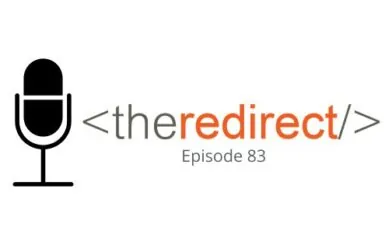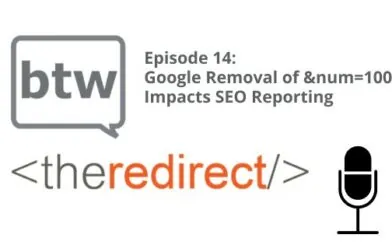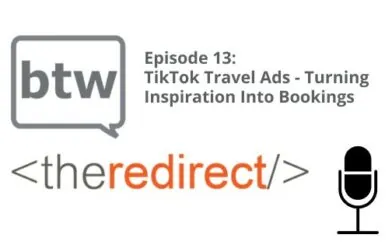Episode 44 / April 27, 2018
Listen now:
Welcome to The Redirect Podcast, where the BlackTruck team shares recent insights and takeaways from the world of search marketing.
In this week’s episode:
- Google continues its rollout of core algorithm updates this past week, with yet another confirmed deployment (begins at 0:56).
- In AdWords, Google and LegitScript partner to allow rehabilitation service organizations to bid on phrases related to drug and alcohol rehab – but there’s a catch (begins at 3:34).
- For those who operate sites with a lot of seasonal content such as single year events, how closely do you pay attention to those pieces of content? Are you making content duplication errors when you could simplify the process? (begins at 12:47).
- Why image-heavy sites could rank poorly (begins at 16:22).
Another Google Core Algorithm Update
Google confirmed last week that there was another broad core algorithm implemented update last Monday, but it’s unknown if it is completed or still rolling out.
While Google’s John Mueller has clarified that most of Google’s algorithm updates are focused on relevance to queries rather than strictly related to quality, it’s still important to remember Google keeps in mind expertise, authoritativeness, and trustworthiness – “E-A-T” – when determining the quality of a site’s content.
How will you know if your site has been affected by the recent updates? Keep an eye on Search Console: Do you see more pages being indexed? Do you see ranks/impressions increasing/decreasing? Keep in mind that depending on your industry/region, you may not be affected, and the effects could be great or small.
Read more from Search Engine Journal and Search Engine Roundtable.
Google to Allow Rehabilitation Services Ads Again, After Intense Vetting
Search Engine Land recently reported that Google and LegitScript are partnering to certify addiction treatment center advertisers.
These types of advertisements were previously suspended completely, after a series of strict limitations on substance abuse-related PPC marketing due to heavy scamming and marketer/clinic kickback programs in a corner of the world that has potential for dark encounters. Google has now partnered with LegitScript to certify advertisers and clinics to re-initiate their marketing programs.
Applications are now being accepted, and starting in July, LegitScript will begin offering Google Certification. A lot of hoops, contracts, and signatures will be required to verify and approve of these vendors before they get the green light. Additionally, there is a cost associated: $995 to get your foot in the door, and then $1995 each year to maintain.
This will open the door for anything rehab and pharma-related, as long as it’s on the up and up on a federal level; that means no marijuana advertising yet – even in states where it’s legal on a state level.
On a related note, Google has put their technology to good work with the DEA to assist in the fight against opioid crisis in the United States for National Prescription Take Back Day; read more from Google.
Strategies for Event or Seasonal Pages
What do you do when you have “event” pages on your website once the date is passed? This could apply to one-time events, events that are only relevant on a seasonal basis, or annual events that might change in theme and other details from year to year. You might consider these pages obsolete and something that can go away once the event has come and gone, but that depends on how these pages function on your site.
For instance, let’s say you’re in manufacturing and these pages meant to merely serve a “listing” function, to display which industry shows you can be found at in the near future and when. Or are these fairly information-rich pages that have some value beyond just saying where you’ll be and when?
Before you do any page removal, It’s worth first asking: Is this a big enough show in your industry that you might be able to attract new traffic to your site from people researching it? Are there any opportunities to build these pages out more to potentially capture more search traffic related to these events, such as featuring your past involvement, seminars, etc.?)
This topic was recently addressed on Yoast’s blog. The person who prompted the article was worried about removing too many pages from the site if they got rid of the events pages. The advice was as follows:
- Are the pages “thin” (not much info or industry value, and not worth developing further)? Delete them (and redirect the URLs, of course!).
- Are the pages rich in information? Keep them on your site as history.
- For yearly events, have a page that returns every year, because your rankings for searches around the event will improve over time. (We’d like to add, there is a lot of value in keeping that page up year-round and updating with current info as the event is planned for the next year).
The most important thing to remember is to HAVE a strategy for these kinds of pages. It’s all too easy to create a new page for every year of the event, but when there’s already a URL from a previous year, you risk creating duplicate content on your site and potentially eating up valuable crawl budget with superfluous pages.
Google on Image Heavy Pages
It seems to be very common lately in web design that we see an overuse of either very large images, or pages built out with heavy image usage. This, as The SEM Post points out from a recent AMA with Google’s John Mueller, can be problematic.
The issue with pages that are very image-centric, is that Google is looking for the text on the page as the actual content it’s using for ranking. For some sites, with a lot of images and limited text, it’s going to be difficult for Google to interpret what that page is; therefore it’s hard for them to go ahead and rank it.
John goes on to deep dive a bit more and discuss how user-generated content around images could be helpful. This is a great point to bring up, as Google has discussed before how they sometimes can weigh more in favor of user-generated content on a page.
We should note that as a general rule for our discussions, content isn’t just limited to “text.” Content on a site should include a number of elements, such as text, images, videos, etc.
Thanks for tuning in! To catch future episodes of The Redirect Podcast, subscribe on SoundCloud, iTunes, or Stitcher.



